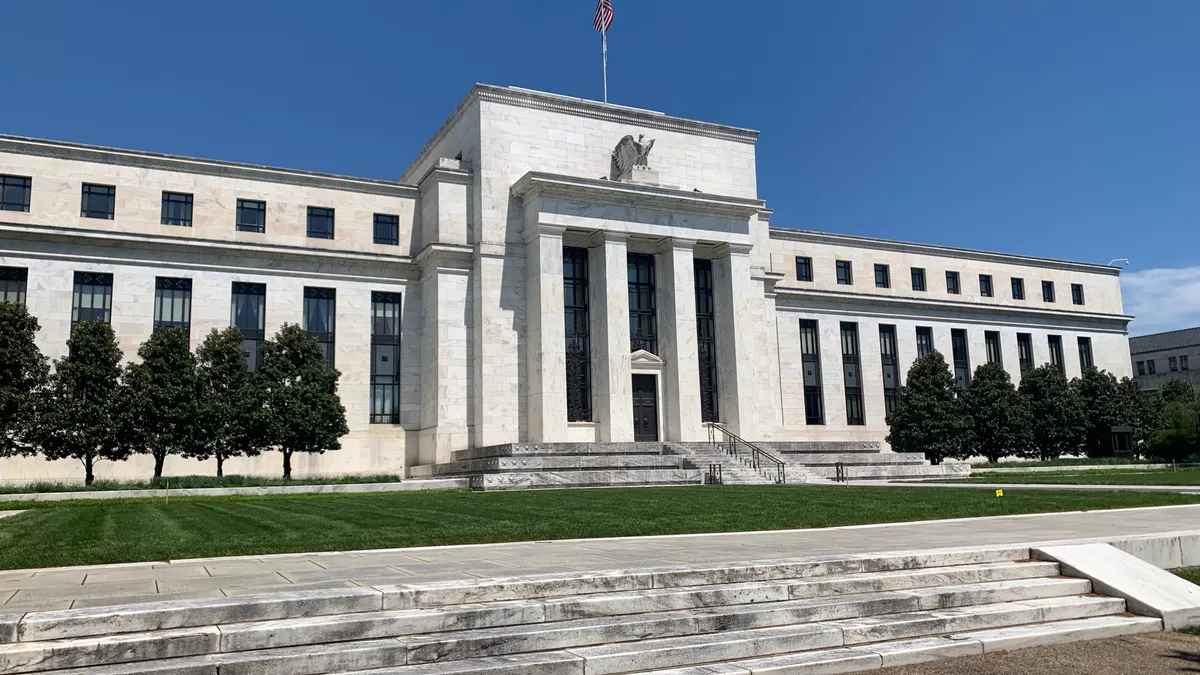UPDATE: June 15, 2020: The Federal Reserve opened its Main Street Lending Program on Monday to businesses with up to 15,000 employees or $5 billion in revenue.
"Lenders can find the necessary registration documents on the program site and are encouraged to begin making Main Street program loans immediately,” the Boston Fed, which will administer the program, said on its website.
The Fed will begin purchasing 95% of loans made through the program’s three facilities “soon,” the Boston Fed said.
Dive Brief:
- The Federal Reserve made several changes to its $600 billion Main Street Lending Program on Monday, allowing more businesses to participate. The Fed lowered loan minimums to $250,000 from $500,000, and extended the loan term to five years from four. Companies also will be able to defer principal payments on their loans for two years, rather than one.
- The Fed also sweetened the pot for lending banks, bolstering its stake in the Main Street Lending Program's riskiest loans to 95%. The Fed earlier said it would purchase 85% of priority loans, leaving 15% on banks' balance sheets. The 95% figure matches the proportion the Fed said it would buy in all loans made through the program's other two facilities: new and extended loans.
- Lender registration for the program is set to begin "soon" and the Fed will start buying loans "shortly afterward," the central bank said Monday. That follows comments from Fed Chair Jerome Powell, who said May 29 the program was "days" away from launching.
Dive Insight:
Monday's changes mark the second round of tweaks to the program's restrictions since the coronavirus relief measure was announced in late March. Previous adjustments lowered the loan minimum from $1 million and expanded eligibility to businesses with up to 15,000 employees and annual revenue of $5 billion or less.
"Supporting small and mid-sized businesses so they are ready to reopen and rehire workers will help foster a broad-based economic recovery," Powell said in a statement Monday. "I am confident the changes we are making will improve the ability of the Main Street Lending Program to support employment during this difficult period."
In addition to boosting loan minimums, the Fed increased the maximum loan size for each of the program’s facilities. Borrowers under the platform for new loans will be able to get up to $35 million — an increase from $25 million previously. Priority loan borrowers are allowed up to $50 million, an increase from $25 million. And expanded loan borrowers, whose cap previously was $200 million, can get up to $300 million.
The changes were meant to entice a wider swath of businesses to participate and ease banks' fears they'd be left responsible for an untenable share of bad loans. Lawmakers have also raised concerns about the delay in launching the program.
"There was some thought that the program was a paper tiger that looked really good but wouldn't be used," Nathan Sheets, chief economist for PGIM Fixed Income, told Bloomberg. "The Fed is saying that they really want to lend through this window, that this is important for the economy."
Despite Monday's alterations, some of the program's limitations remain, including restrictions on dividends and executive pay. Many companies owned by private-equity firms also remain ineligible because of an affiliate rule.
Environmental groups are concerned the Fed's attempt to reach more businesses will allow fossil-fuel companies, which can't qualify for support from other Fed lending facilities, to participate.
The program will still accept loans that were made under the old terms if they were funded before Wednesday. Powell could also shed more light on the program that day, after the Fed’s policy-setting committee convenes.
"The changes announced by the Fed today are helpful but not game-changing for most businesses," Carolyn Alford, a partner at King & Spalding, told Bloomberg. "The modifications to defer payments and extend the life of loans will provide all companies more relief as they weather the economic uncertainty over the foreseeable future."
Unlike loans under the Paycheck Protection Program, Main Street loans are not eligible for forgiveness.











